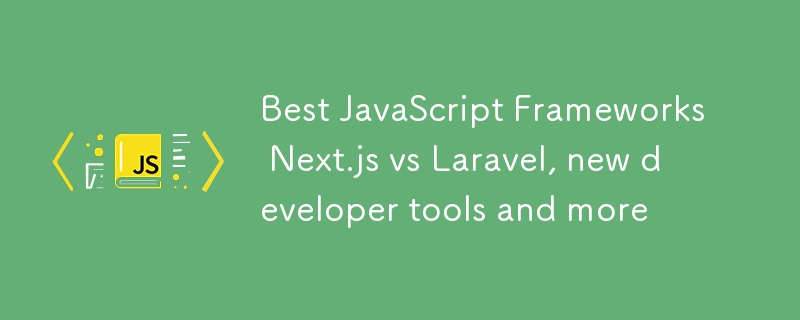Home >Web Front-end >JS Tutorial >Best JavaScript Frameworks Next.js vs Laravel, new developer tools and more
Best JavaScript Frameworks Next.js vs Laravel, new developer tools and more
- Barbara StreisandOriginal
- 2025-01-06 07:09:40971browse

Hello JavaScript Enthusiasts!
Welcome to the newest edition of "This Week in JavaScript!"
We've got some exciting trends to kick off 2025, including the evolution of tech stacks, the Laravel vs Next.js rivalry, and some handy new tools to supercharge your dev process.
What’s New in JavaScript Tech Stacks?
2025 brings smarter, faster, and more efficient tech stacks with the help of AI-assisted development. Here’s a quick breakdown of what's powering JavaScript development this year:
Frontend: Next.js 14 remains the go-to for React-based projects, offering server-side rendering (SSR) and static site generation (SSG) to optimize performance.
Data Fetching: Combine Next.js with React Query, which makes managing data flows a breeze while speeding up load times.
Backend: For startups, it’s all about Supabase for real-time apps or NestJS for scalable, modular backend systems, both with full TypeScript support.
UI Libraries: Shadcn/UI (built on Tailwind CSS) is becoming the favorite for fast, accessible prototyping.
Meta frameworks like Next.js were also ranked #1 in the 2024 JS Survey, showing how they're becoming the backbone of modern web development.
Laravel vs. Next.js: The Framework Rivalry
In 2025, Laravel and Next.js are starting to step on each other's toes:
Next.js: Expanding into backend territory with enhanced server-side features.
Laravel: Adding frontend-friendly features like file-based routing and React component support.
But Inertia.js 2.0 shakes things up for Laravel devs, enabling them to build single-page apps without needing a traditional API—thanks to async requests, deferred props, and prefetching (sound familiar, Next.js fans?).
The lines between frontend and backend frameworks are blurring more than ever. Whether you're on team Next.js or Laravel, one thing’s clear—both are pushing the boundaries of modern app development.
Tools & Releases You Should Know About
Stay ahead of the curve with these must-know tools and releases from the JavaScript ecosystem:
- Roadmap UI: Inspired by tools like Linear and Jira, this open-source kit lets you create interactive Gantt charts, Kanban boards, and calendars. Fully customizable and performance-optimized, it's perfect for scaling project management.
Docusaurus 3.7: Now with React 19 support, customizable SVG imports, and key performance upgrades, it's a smooth, developer-friendly option for documenting APIs or onboarding workflows.
Tailwindcss-motion: This gem by RomboHQ lets you add smooth animations to your Tailwind projects using utility classes—no custom keyframes required. Their Chrome extension even lets you design animations visually.
Midscene.js: AI-powered UI automation that lets you run commands, query data, and create assertions using natural language. Seamlessly integrates with Playwright and Puppeteer, making it easier to generate visual reports for debugging.
jQuery 4.0.0 Beta 2: Yes, jQuery’s still here! This latest release brings better ESM/CommonJS support, improved handling of boolean attributes, and a slim build for lighter projects.
And that wraps up this issue of This Week In JavaScript!
Be sure to share this newsletter with your fellow developers and follow for the latest weekly JavaScript updates.
Until next time, happy coding!
References
The Ultimate Tech Stack 2025
Inertia.js 2.0
Roadmap UI
Docusaurus 3.7
Tailwind CSS-motion
Midscene.js
jQuery 4.0.0 Beta 2
The above is the detailed content of Best JavaScript Frameworks Next.js vs Laravel, new developer tools and more. For more information, please follow other related articles on the PHP Chinese website!
Related articles
See more- An in-depth analysis of the Bootstrap list group component
- Detailed explanation of JavaScript function currying
- Complete example of JS password generation and strength detection (with demo source code download)
- Angularjs integrates WeChat UI (weui)
- How to quickly switch between Traditional Chinese and Simplified Chinese with JavaScript and the trick for websites to support switching between Simplified and Traditional Chinese_javascript skills

